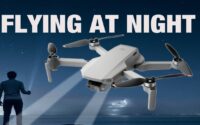Revolutionizing the Future of Technology
Dron and Dickson: Revolutionizing the Future of Technology
Dron and Dickson, a pioneering tech company, are at the forefront of revolutionizing the future of technology. With their innovative approach and cutting-edge products, they have transformed various industries and continue to push boundaries.
One of the key factors driving Dron and Dickson’s success is their relentless pursuit of excellence in research and development. Through their state-of-the-art facilities and expert teams, they consistently deliver groundbreaking solutions that reshape the technological landscape.
Dron and Dickson’s product portfolio encompasses a wide range of industries, including aerospace, energy, robotics, and telecommunications. Their drones, in particular, have garnered significant attention for their exceptional performance and versatility. Equipped with advanced sensors and intelligent software, these drones have revolutionized industries such as agriculture, surveillance, and logistics.
Moreover, Dron and Dickson’s commitment to sustainability sets them apart from their competitors. They prioritize eco-friendly practices, such as developing energy-efficient technologies and implementing responsible manufacturing processes. By aligning their goals with global sustainability initiatives, they contribute to a greener and more sustainable future.
Collaboration is a fundamental aspect of Dron and Dickson’s approach. They actively seek partnerships with other innovative companies and academic institutions to foster knowledge exchange and accelerate technological advancements. Through these collaborations, they have successfully developed groundbreaking solutions that address complex challenges.
As a customer-centric organization, Dron and Dickson prioritize user experience and satisfaction. They continuously engage with their customers, seeking feedback and insights to improve their products and services. This customer-centric approach has earned them a loyal and satisfied customer base.
Transforming Industries with Drone Technology
Drones – unmanned aerial vehicles – have revolutionized various industries, and one company at the forefront of this transformation is Dron & Dickson. With their innovative drone technology solutions, they have significantly impacted multiple sectors, enhancing efficiency and safety.
One industry benefiting from Dron & Dickson’s drones is agriculture. Their drones equipped with advanced sensors and cameras can monitor crop health, detect diseases, and optimize irrigation, helping farmers increase yields and minimize resource wastage.
In the construction sector, Dron & Dickson’s drones offer remarkable advantages. These aerial devices can conduct site surveys, monitor construction progress, and perform inspections, reducing costs and improving safety by minimizing the need for manual labor and potentially hazardous tasks.
The energy industry has also witnessed the positive impact of Dron & Dickson’s drone technology. Drones enable the inspection of power lines, wind turbines, and solar panels, identifying maintenance needs, potential failures, and improving overall system reliability.
Another sector transformed by Dron & Dickson is transportation and logistics. Drones can be used for inventory management, package delivery, and monitoring supply chain operations, increasing efficiency and reducing delivery times.
Safety and security are paramount in many industries, and Dron & Dickson’s drones play a vital role in this aspect. They can perform surveillance tasks, monitor hazardous areas, and assist in emergency response situations, providing real-time information without risking human lives.
Dron & Dickson’s drones have also found applications in the media and entertainment industry, capturing stunning aerial footage for movies, documentaries, and live events, providing unique perspectives and immersive experiences for viewers.
Addressing Challenges and Ensuring Safety
Drones have emerged as versatile tools, revolutionizing various industries with their wide range of applications. However, their increasing use also poses unique challenges and safety concerns. Let’s delve into the key aspects of addressing these challenges and ensuring safety in the context of Drones and Dickson.
Regulations and Compliance – Governments and regulatory bodies play a crucial role in establishing guidelines and rules for drone operations. Compliance with these regulations is essential to mitigate potential risks and ensure the safety of both operators and the public.
-
Operator Training and Certification – Proper training and certification programs equip drone operators with the necessary knowledge and skills to operate drones safely. These programs cover topics such as flight planning, emergency procedures, and understanding airspace restrictions.
-
Advanced Flight Control Systems – The development of sophisticated flight control systems enables drones to navigate complex environments with precision, reducing the likelihood of accidents. Incorporating technologies like obstacle avoidance and automated emergency response mechanisms enhances safety.
-
Geofencing and No-Fly Zones – Implementing geofencing technology helps prevent drones from entering restricted areas or sensitive locations such as airports, military bases, or crowded public spaces. These virtual boundaries act as a proactive measure to ensure safety and security.
-
Enhanced Communication Systems – Effective communication between drones and ground control stations is essential for safe operations. Real-time data exchange, including weather updates and airspace notifications, helps operators make informed decisions and avoid potential hazards.
-
Payload Safety and Maintenance – Regular maintenance checks and adherence to payload weight limitations are crucial to ensure optimal performance and prevent accidents. Properly securing payloads is essential to avoid injury or damage caused by falling objects.
-
Privacy and Data Protection – Addressing concerns related to privacy and data protection is paramount. Clear policies should be established to outline how drone-collected data is used, stored, and shared, respecting individuals’ rights and complying with relevant regulations.
-
Counter-Drone Measures – The potential risks associated with unauthorized drones necessitate the implementation of counter-drone technologies. These measures aim to detect, track, and mitigate the impact of rogue drones that may pose safety or security threats.
-
Public Awareness and Education – Raising awareness among the public about responsible drone usage and potential safety risks fosters a culture of safety. Educational campaigns and initiatives can educate communities about the safe operation of drones and the importance of following regulations.
The Future of Drones: Limitless Possibilities
In agriculture, drones equipped with advanced sensors can monitor crops, detect diseases, and optimize irrigation, leading to higher yields and reduced costs.
Drones are also transforming the delivery industry—fast, autonomous, and precise, they can transport goods efficiently, even in hard-to-reach areas, revolutionizing logistics.
With their ability to access remote or dangerous locations, drones are becoming invaluable tools for search and rescue missions, aiding in locating missing persons or assessing disaster areas quickly and safely.
In the field of filmmaking, drones offer breathtaking aerial shots that were once only possible with expensive equipment. They provide filmmakers with creative angles and perspectives, enhancing storytelling.
Drones are making construction sites safer and more efficient by conducting aerial inspections, monitoring progress, and identifying potential hazards, reducing risks and saving time.
In the realm of environmental conservation, drones can monitor wildlife populations, track deforestation, and even help fight against poaching, providing crucial data for conservation efforts.
The future also holds promise for drone taxis, enabling convenient and eco-friendly urban transportation, reducing traffic congestion and emissions.
However, along with their vast potential, drones also raise concerns about privacy, security, and air traffic management. Striking a balance between innovation and regulation will be vital for their responsible and widespread use.



